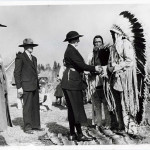We run our website the way we wished the whole internet worked: we provide high quality original content with no ads. We are funded solely by your direct support. Please consider supporting this project.
Swords into Plowshares
Kelley Nikondeha over at SheLoves wrote a penetrating essay on the work of peace and the prophet’s dreams of replacing the work of war into the work of feeding people. Peace isn’t passive. It’s hard work.
From Kelley’s essay:
Beating swords into plowshares is hard work–hammering, melting, reworking and shaping new tools. Transformation of this magnitude comes with sweat and sustained labor. Moving beyond hostility and hatred produces calloused hands, sore muscles and bone-deep exhaustion. Welders, after all, forge the lasting peace, a signal that maybe we need the work ethic of a tradesman for the task at hand.
But this ancient song is about more than bringing peace. Remember, we see God sorting things out between nations, negotiating the peace. It might be that their response, beating the swords and spears into something more useful, points to how we sustain that peace.
Category: General
Tags: Non-Violence, Peace, Peacemaking, Swords into Plowshares, War
Related Reading

Why Did Jesus Command His Disciples to Arm Themselves With Swords? (podcast)
In this episode Greg looks at the command in Luke 22 to buy a sword. Episode 46 http://traffic.libsyn.com/askgregboyd/Episode_0046.mp3

The Politics of Jesus
Many are so conditioned by the mindset of the world that they can’t even envision an alternative way of affecting society and politics other than by playing the political game as it is done by the established governmental system. Some thus conclude that, since Jesus didn’t try to overhaul the political systems of his day…

Views of an Indigenous Theologian
It’s so important to approach evangelism with humility when building relationships with indigenous populations. This interview with Dr. Randy Woodley is an eye-opening and important voice for anyone with a heart for missions. From the interview: You can still do a lot of good, don’t give up so soon. The best is yet to come…

The Cleansing of the Temple and Non-Violence
Jesus’ cleansing of the Temple is the most commonly cited example of those who allege that he did not absolutize loving enemies or refraining from violence. I submit that this episode implies nothing of the sort. First, it is important that we understand that this episode was not an expression of unpremeditated anger on Jesus’…

That Weird Episode with the Pigs
In my opinion, the single strangest episode recounted in the Gospels is the account of Jesus’ encounter with a demonized man that ended with two thousand pigs drowning themselves in the Sea of Galilee (Mk 5:1-10//Mt 8:28-34; Lk 8:26-39). Some find it morally objectionable that this mass suicide was the result of Jesus allowing the…

Can Christians serve in the military?
Question: Jesus ministered to military people (e.g. a centurion) and didn’t tell them to leave their military post. So do you think Christians can serve in the military? I believe it’s a Christians duty is to serve their country, aid the wounded, defend the oppressed, protect our families, stand for truth and justice, and kill…

